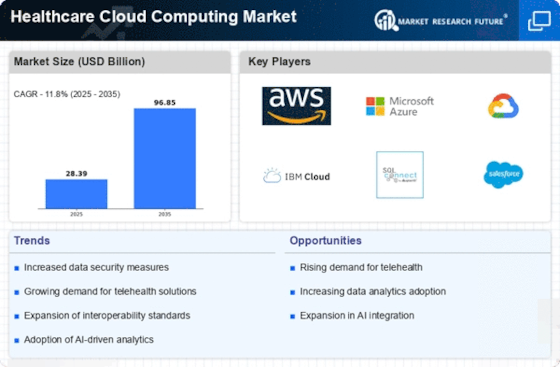Market Analysis
In-depth Analysis of Healthcare Cloud Computing Market Industry Landscape
The Healthcare Cloud Computing market is experiencing rapid adoption as healthcare providers embrace cloud-based solutions to enhance their operational efficiency and data management. The move to cloud computing facilitates better availability, flexibility, and economy in handling colossal volumes of health-related data. Although the market for Healthcare Cloud Computing has considerably adopted, data security remains a leading challenge. In order to comply with the industry’s stringent regulatory requirements, providers spend tremendous amounts of money on complex encryption, secure authentication and compliance measures. Cloud computing as a viable cost-effective alternative for healthcare organization this would reduce physical infrastructures and maintenance costs. The pay-as-you go approach enables providers to respond dynamically to demand by expanding the level of their resources, thereby reducing operational costs and fostering financial stability. It is the need for interoperability that has triggered amalgamation of healthcare cloud solutions with current utilities. Through the use of cloud computing, patient data can be shared consistently across various departments and health facilities which leads to collaborative care that eventually benefits patients positively. The increased growth of telehealth services has further fuelled the development of Healthcare Cloud Computing. Cloud-based platforms enable remote consultations, data sharing and real time collaboration which translates to efficient delivery of care that is accessible to patients regardless where they are. Cloud computing is an integral part of Health Information Exchange initiatives. Cloud-based platforms allow for a secure and standardized sharing of patient data among clinicians, increasing the continuity of care and decreasing redundant diagnostic tests. For personalized patient care, predictive analytics and population health management cloud computing provides the required infrastructure for processing enormous datasets that leads to meaningful results. HIPAA and other regulatory frameworks pose notable challenges in terms of adherence among healthcare cloud providers. Market dynamics include persistent efforts to create solutions meeting the required regulations, data security and legality. The number of edge computing in the healthcare cloud setting is significant. Edge computing enables data processing nearer to the source and thereby lowers latency as well as improves real-time capabilities. This is especially important in healthcare situations where timely availability of vital information plays a very critical role.
The global healthcare cloud computing market is growing by the wide spread of providers’ services to international health care systems. This globalization is primarily led by the need for standardized and interoperable solutions, which ensured effective collaboration of healthcare organizations on a worldwide scale. To overcoming the change resistance and ensuring seamless implementation of healthcare cloud computing, education and training initiatives are undertaken by providers. These programs aim to familiarize healthcare professionals with the functionalities of cloud-based systems, ensuring optimal utilization and promoting a culture of continuous learning.


















Leave a Comment